This Black History Month, the HRPA is speaking with Black HR professionals about what Black History means to them, why it’s an important celebration, and what we can all do to combat anti-Black racism in our workplaces to ensure all workers can thrive. Thank you to Tanya Sinclair, CHRE, Director of Talent Management at Ryerson University and Founder of Black Human Resources Professionals of Canada (Black HRPC); Leah Carr, CHRP, Director of Human Resources at IGNITE; Ope Famoroti, CHRL, HR professional; Adeola Atofarati, HR Student at Centennial College and intern at Black HRPC; and Annette Lawrence, CHRL, HR Consultant at MaxPeople, for sharing your perspectives.
Q: What does Black History Month mean to you?
Tanya: For me, Black History Month is the time of year where all of Canada can celebrate the Black Excellence that we see today, while also acknowledging the past. In the month of February, I can always look forward to participating in great activities and events with a dedicated focus on the Afro-Caribbean community.
Leah: For me, Black History Month is a time dedicated to celebrating Black culture and the journey Black people have been on; honouring our ancestors and those who have paved the way for many Black people and leaders then, now and in the future to achieve success. It’s a proud moment when I reflect and celebrate my own successes and achievements as a Black woman and HR professional.
Ope: I believe Black History Month is an important recognition of the contributions, brilliance and hard work of Black diasporic individuals in North America. It is a month in which we remind non-Black folks, primarily Caucasian, that we are worth celebration and education, worth promoting, and worth life preservation. I have mixed feelings about Black History Month such as ‘why just one month?’ Shouldn’t discussions around DEI be an everyday exercise embedded into all institutions and championed by every leader? After all, every day and every month of the year Black voices are silenced, our pain is ignored or minimized, and the reality of the Black experience is denied or debated by other races.
Adeola: As a Black international student experiencing this celebration for the first time, it is comforting to know that there is a period we (as a people) recognize, honour and celebrate our heritage – a period we reflect on our past (ancient past and immediate past) as well as our great achievements and contributions to the world. It’s a time to also reflect on how far we have come, while calling attention to the systemic issues that still affect us.
Annette: As a first generation Canadian, this month allows me to learn more about all the contributions Black Canadians have made to Canada’s history, as well as highlight and celebrate the accomplishments of Black Canadians who are making things happen right now in our country. The inclusion of Black Canadian, Viola Desmond, on the Canadian ten dollar bill was a great step in recognizing Black contributions both nationally and internationally. I love that all Canadians can gather together to celebrate our history during this month as Black History is Canadian history.
Q: What are some of the biggest challenges Black HR professionals are facing right now?
Tanya: Fatigue is plaguing many HR people right now. Mental health, systemic racism and career advancement continue to be three challenges that come up. From my own network at the Black HRPC 1 people say they are tired and the pandemic has increased that fatigue. Even before the pandemic, Black HR professionals reported being underpaid, overworked, overlooked and generally taken for granted due to systemic racism. Now with the pandemic, that pressure has increased as HR professionals are called on to create programs to prevent or fix things from vaccination policies to complex work accommodations, all while ensuring legal compliance in a state of flux. We are asked to increase employee engagement, to retain and train top talent, and to attract diverse job applicants. And the list goes on, even though all of the items I’ve listed cannot be achieved by HR alone. Management, together with employees, play a key role in partnering with HR to achieve organizational goals.
The business partner role comes naturally in the HR profession, but it can be exhausting. For Black HR professionals especially, we have to face the prevalence of systemic barriers and microaggressions on top of all the work demands. The challenge is that everything is intensified and leads to more burnout. People are re-evaluating their career paths.
Leah: As Black HR professionals, some of the biggest challenges we face is the assumed responsibility of needing to change the culture of organizations, break systemic barriers, and identify and build environments that are equitable and diverse because ‘you’ as a Black HR professional are often assumed to represent ‘all’.
Ope: One historically and continuing challenge Black HR professionals face is trauma. This collective trauma is due to years and generations of Black people being overlooked and/or tokenized in our workplaces and society. This trauma, I think, prevents many of us from owning our own voices even when our opinions are sought after.
I would add that even when we assume and are promoted into certain roles and senior positions, we often aren’t granted the same opportunities as our non-Black peers.
Adeola: I would say that one of the biggest challenges is underrepresentation of Black HR professionals in the workplace. There is also limited support structures in place that promote diversity and inclusion in many organizations. Finally, Black HR professionals and Black HR students, as a whole, often end up with less access to senior-level sponsorship and support than our counterparts.
Annette: It’s a combination of dealing with the pandemic, anti-Black racism and being advocates for change within our organizations. HR professionals are in the spotlight more than ever as they help their employers through this pandemic and we still need to hold space and time to process our own lived experiences. There’s this unspoken pressure and demand from inside and outside of the workplace to manage and fix DEI issues. We are already trying to navigate these spaces and policies that directly impact us and often code switching to optimize the comfort of others in exchange for fair treatment. This all leads to exhaustion and burnout, and leaves us with less room for development and growth in our profession.
Q: How can HR professionals address racism in the workplace?
Leah: It starts with an organization providing ongoing dialogue, training, and education around race and being open to having difficult conversations all year round. This is not just something that should get attention in February. Also, it is important for organizations to adjust their recruitment processes to remove the potential for unconscious bias which may occur even at the prescreening stage. Organizations should also ensure that there is Black representation in their interviewing panels.
Ope: I think having very frank conversations around race is a good step. This allows us to show up as our authentic selves with all our cultural and ethnic nuances.
I think it is also important to expand the conversation and discuss intersectionality – and prop up other marginalized folks. Like Martin Luther King Jr. said: “Injustice anywhere is a threat to justice everywhere. We are caught in an inescapable network of mutuality, tied in a single garment of destiny. Whatever affects one directly, affects all indirectly.”
Adeola: I believe racism exists mainly because we have put labels on people. If employees/employers will see people and talents first rather than classifications, then it will be easier to have work environments where differences are embraced. HR professionals can help by aligning with company leaders in creating an environment and culture that promotes behavioural change and by also building strong Employee Resource Groups (ERGs).
Annette: Employers tend to focus on the education piece when it comes to racism however, it’s more than that. It is about being intentional with your interactions, your decisions, your strategies and your policies. You have to look at things from an equitable lens and seek to understand how this all permeates throughout the employee’s lifecycle and impacts their experience at the company. Employers can look to set up DEI committees or ERGs, establish a process to report harassment and discrimination, and look to create safe spaces for employees to share their feedback and be listened to.
Also, it is important to understand that people are not monolithic, as they have multiple identities (intersectionality) and deal with different things. A one-size-fits-all strategy does not work and employers have to continuously put in the work to assess, address and modify their policies and procedures for their ever-changing work environments.
Q: How can we all better support Black employees (incl. other Black HR professionals)?
Tanya: I think there is a tendency to rely on Black folks to do the work to fix the problems we didn’t create. The work of dismantling systemic racism needs to be done with the Black community, but we should not have to do all the heavy lifting. Workplaces and senior leaders need to be careful not to expect their diversity leader or HR leader to magically end racism. Diversity professionals (many of whom are racialized) are also at risk of burnout. I think organizations have been off to a good start by acknowledging that things need to change and seeking guidance from Black staff and diversity leaders, but we’re really still on the first lap of this marathon.
We need more sleeves rolling up at all levels, in workplaces across Canada, in order to better support Black workers. A 2020 study by the Diversity Institute 2 shows that “Black people represent 5.6% of the population across the eight cities studied, however they occupy only 2% of the board positions overall in the five sectors analyzed.” Until there is intentional and significant representation, inclusion and career advancement of Black staff at all levels, including senior leadership, the engagement and retention rates of Black employees is unlikely to improve. Leaders need to listen to their Black employees. They will tell you what needs to be done.
Leah: I think we can give Black employees space to exist and thrive. I also believe that all leaders (allies) should listen, engage, but most importantly take action. When fear is present, safety in the workplace is not. Remove the fear Black employees may have around speaking up and expressing feelings.
Ope: I think organizations and all people need to actively participate in anti-racist initiatives as well as build relationships with Black communities and organizations, like the Black HRPC.
Adeola: It starts with recruitment. Our recruitment policies and processes must embrace diversity, equity and inclusion, not just on paper, but in practice. We must be open to looking for and hiring talents outside the stereotypical images we have. The more representation we have, the more we can disrupt the prejudices and systemic racism that Black employees face in their organizations.
Annette: Not many C-Suite HR professionals look like me as it is all about access and opportunity. Provide access to tools, resources, mentorship, and/or sponsorship to Black employees as it will help them grow and develop in the profession so, when those opportunities become available, they can step into those leadership roles and have a voice at the table. Re-assess your current programs and policies to see how they are working for Black employees. Help elevate your Black employees’ voices, their ideas and their work as it can be easy to default to the status quo as it is less tedious to do so.
Q: Are there any Black leaders that inspire you?
Tanya: There are so many Black folks that I admire that it is quite hard to only list a few. Lately, I am most inspired by everyday people who are doing wonderful things for the Black community. I am thinking of the determination our Black Canadian Olympians and of the tenacity of the business owners in Little Jamaica. For our youth I think of 15-year-old author Aisha Boubacar, who published her first book last year celebrating Black hair. Anyone at any age can have a positive impact and their achievements bring me joy.
Ope: I admire Jermaine Murray, Madison Butler, Tanya Sinclair, Janaya Khan, Luvvie Ajayi, Bozoma St. John., Marsha Forde, Elizabeth Adefioye, Tobi Oluwole, Obinna Oraka and Lekan Olawoye. I’m also grateful for the work being done by Nia Centre for the Arts and R.IS.E.. These folks are amplifying Black voices and thought leadership in the arts, business and literary, and youth and community development spaces — and publicly advocate for more growth and opportunities for Black folks.
Adeola: All Black immigrants who are advancing in their professions, questioning the status quo, demonstrating Black Excellence, and paving the way for future generations.
Interviewee Bios:
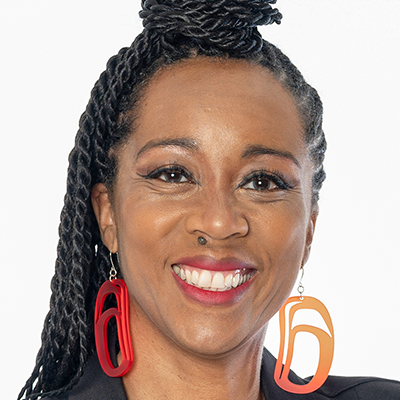
Tanya Sinclair
CHRE, Director of Talent Management and Founder of Black Human Resources Professionals of Canada
Tanya Sinclair is an award-winning Human Resources Leader providing strategy, advocacy, and policy development advice with a focus on well-being, diversity and inclusion. Tanya holds the Certified Human Resources Executive (CHRE) designation along with the Distinguished HR Professional (DHRP) award of distinction. Tanya is an active community volunteer and has served on several Boards and advisory committees. Tanya has a Master of Arts degree in Interdisciplinary Studies from Royal Roads University in B.C. Tanya is currently the Director, Talent Management at Ryerson University (renaming in process). In 2020, she founded a not-for-profit network called Black Human Resources Professionals of Canada through her desire to directly discover, connect and empower all Black HR professionals www.blackhrpc.org.
Tanya’s leadership philosophy is lead, learn, laugh.
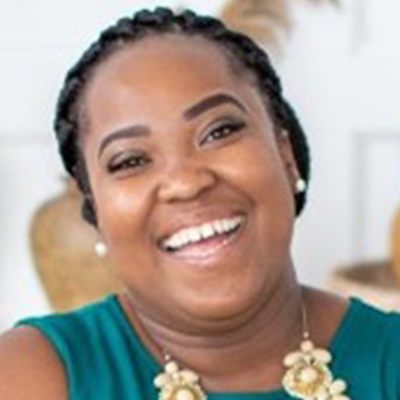
Leah Carr
CHRP, Director of Human Resources at IGNITE
Leah Carr is a HR Professional with 15 years of experience working in the hospitality, manufacturing, and not-for-profit sectors. Leah is a Certified Human Resources Professional (CHRP) and is currently the Director of Human Resources at IGNITE, student Union at Humber and Guelph-Humber University. Overseeing all aspects of human resources management, she has proven success in creating cultures of collaboration and implementing change to achieve workforce excellence. In her free time, she enjoys spending time with her family, traveling, and playing softball.
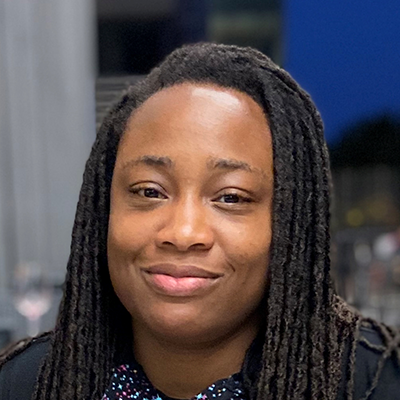
Ope Famoroti
CHRL, HR professional
Famoroti is a Nigerian born, Canadian educated, queer, HR professional with varied experience across several industries/sectors. Ope is most passionate when talking about all things diversity and equity, for any and all marginalized communities. Ope also enjoys Improv, most fitness activities and random adventures.
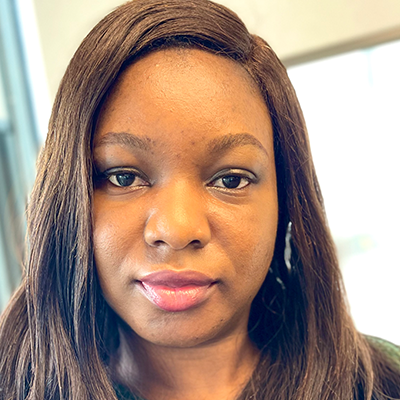
Adeola Atofarati
HR Student at Centennial College and intern at Black HRPC
Adeola Atofarati is an internationally trained Black HR Professional with over 7 years experience in Human Resources Management. She’s currently a student at Centennial College and an intern at BlackHRPC where she’s gaining a rich work-integrated-learning experience.
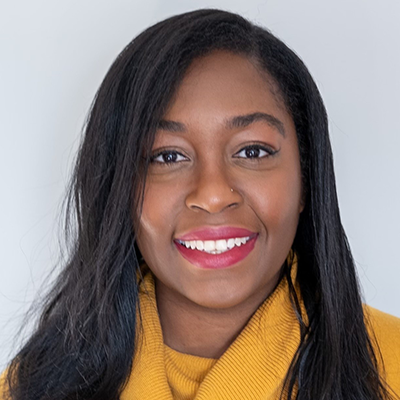
Annette Lawrence
CHRL, HR Consultant at MaxPeople
Annette Lawrence is an HR Consultant at MaxPeople, a professional Human Resources consulting firm offering HR services, Training, Recruitment and Employment Law support for organizations in need of an effective people strategy to grow their business.
Annette has worked in various industries including Legal Services, Retail, Higher Education, and Non-Profit and has managed and advised leaders and multi-generational teams, implemented employee engagement strategies, and optimized HR processes and systems to bring efficiencies to businesses.
Annette has a Bachelor’s of Commerce degree in Finance from Ryerson University coupled with a Postgraduate Certificate in Human Resources Management from Seneca College. She is in good standing with the HRPA, holds both the CHRP and CHRL designations, and actively volunteers in a number of mentorship-focused organizations and professional associations. Her diverse experience grants her a breadth of skills, knowledge, and perspectives, to help her clients achieve their objectives through their people.

Tanya Sinclair
CHRE, Director of Talent Management and Founder of Black Human Resources Professionals of Canada
Tanya Sinclair is an award-winning Human Resources Leader providing strategy, advocacy, and policy development advice with a focus on well-being, diversity and inclusion. Tanya holds the Certified Human Resources Executive (CHRE) designation along with the Distinguished HR Professional (DHRP) award of distinction. Tanya is an active community volunteer and has served on several Boards and advisory committees. Tanya has a Master of Arts degree in Interdisciplinary Studies from Royal Roads University in B.C. Tanya is currently the Director, Talent Management at Ryerson University (renaming in process). In 2020, she founded a not-for-profit network called Black Human Resources Professionals of Canada through her desire to directly discover, connect and empower all Black HR professionals www.blackhrpc.org.
Tanya’s leadership philosophy is lead, learn, laugh.

Leah Carr
CHRP, Director of Human Resources at IGNITE
Leah Carr is a HR Professional with 15 years of experience working in the hospitality, manufacturing, and not-for-profit sectors. Leah is a Certified Human Resources Professional (CHRP) and is currently the Director of Human Resources at IGNITE, student Union at Humber and Guelph-Humber University. Overseeing all aspects of human resources management, she has proven success in creating cultures of collaboration and implementing change to achieve workforce excellence. In her free time, she enjoys spending time with her family, traveling, and playing softball.

Ope Famoroti
CHRL, HR professional
Famoroti is a Nigerian born, Canadian educated, queer, HR professional with varied experience across several industries/sectors. Ope is most passionate when talking about all things diversity and equity, for any and all marginalized communities. Ope also enjoys Improv, most fitness activities and random adventures.

Adeola Atofarati
HR Student at Centennial College and intern at Black HRPC
Adeola Atofarati is an internationally trained Black HR Professional with over 7 years experience in Human Resources Management. She’s currently a student at Centennial College and an intern at BlackHRPC where she’s gaining a rich work-integrated-learning experience.

Annette Lawrence
CHRL, HR Consultant at MaxPeople
Annette Lawrence is an HR Consultant at MaxPeople, a professional Human Resources consulting firm offering HR services, Training, Recruitment and Employment Law support for organizations in need of an effective people strategy to grow their business.
Annette has worked in various industries including Legal Services, Retail, Higher Education, and Non-Profit and has managed and advised leaders and multi-generational teams, implemented employee engagement strategies, and optimized HR processes and systems to bring efficiencies to businesses.
Annette has a Bachelor’s of Commerce degree in Finance from Ryerson University coupled with a Postgraduate Certificate in Human Resources Management from Seneca College. She is in good standing with the HRPA, holds both the CHRP and CHRL designations, and actively volunteers in a number of mentorship-focused organizations and professional associations. Her diverse experience grants her a breadth of skills, knowledge, and perspectives, to help her clients achieve their objectives through their people.
Footnotes:
Footnote 1: View the Black HR Professionals of Canada website
Footnote 2: Ryerson’s Diversity Institute’s new study of Canadian board diversity
